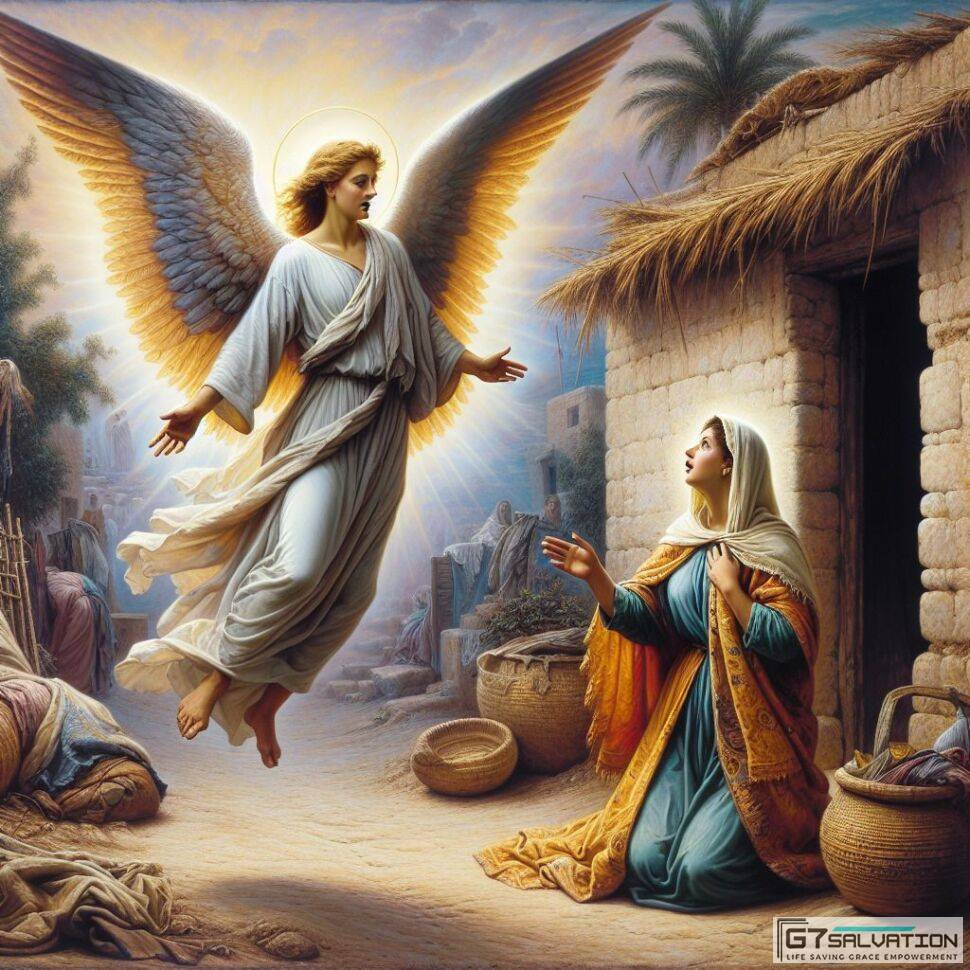Imagine, it’s a quiet night in Bethlehem. The town is nestled in the golden glow of starlight, and the air is filled with a sense of anticipation. This is the town where the most extraordinary story in human history is about to unfold – the story of Jesus’ birth in the Bible.
The biblical story of Jesus’ nativity, often referred to as the Christmas story, has captivated hearts for centuries.
It is a profound tale of love, faith, and divine intervention, steeped in the richness of the Gospel narratives. The birth of Jesus, the central figure of Christianity, is a pivotal moment for believers around the world.
As we delve into this sacred narrative, we will uncover the prophecies and promises that foretold Jesus’ birth, from the Old Testament to the Annunciation to Mary. We will witness Joseph’s unwavering faith as he embarks on a journey to Bethlehem, where the Savior is destined to be born in a humble manger.
We will witness the arrival of the Magi, who follow a celestial path to kneel before the infant Jesus, bearing gifts that symbolize his divinity. We will stand alongside the shepherds as they receive the angelic proclamation of Jesus’ birth, spreading the news of this joyous event.
The Gospel accounts of Luke and Matthew will give us unique perspectives on the birth of Jesus, each with its own details and emphasis. Through these narratives, we will unravel the overarching message of hope, love, and redemption that the birth of Jesus brings to humanity.
So come, journey with us, as we delve into the timeless and transformative story of Jesus’ birth in the Bible.
The Prophecy and Promise of Jesus’ Birth

The biblical account of Jesus’ birth holds deep significance for believers around the world. It is a story rooted in the rich tapestry of Old Testament prophecies, fulfilled through the miraculous birth of Jesus as foretold by the prophets. The birth of Jesus in scripture is a testament to God’s unwavering promise and his divine plan for salvation.
“Therefore the Lord himself will give you a sign: The virgin will conceive and give birth to a son, and will call him Immanuel.”
– Isaiah 7:14
The prophecy of Jesus’ miraculous birth is foretold in various passages of the Old Testament, offering glimpses into God’s redemptive plan. These prophecies create a sense of anticipation and expectation, building the foundation for the fulfillment of God’s promise.
One such prophecy is found in Isaiah 9:6:
Isaiah 9:6 (NKJV)
“For unto us a Child is born, unto us a Son is given; And the government will be upon His shoulder. And His name will be called Wonderful, Counselor, Mighty God, Everlasting Father, Prince of Peace.”
The birth of Jesus fulfilled these prophecies, as recorded in the New Testament. Both the Gospel of Matthew and the Gospel of Luke provide accounts of Jesus’ birth, highlighting the fulfillment of the ancient prophecies and the miraculous nature of his arrival.
In the Gospel of Matthew, we learn that Jesus’ birth in Bethlehem of Judea fulfills the prophecy spoken by the prophet Micah:
“But you, Bethlehem, in the land of Judah, are by no means least among the rulers of Judah; for out of you will come a ruler who will shepherd my people Israel.”
– Matthew 2:6
The Gospel of Luke details the angel Gabriel’s visit to Mary, announcing that she will conceive a son and name him Jesus. This angelic proclamation is a pivotal moment that fulfills the prophecy of a virgin conceiving and giving birth to a son:
“The holy Spirit will come on you, and the power of the Most High will overshadow you. So the holy one to be born will be called the Son of God.”
– Luke 1:35
These biblical accounts of Jesus’ birth affirm the fulfillment of prophecies and the divine orchestration behind his miraculous arrival. They serve as a testament to the faithfulness of God and the ultimate fulfillment of his promises.
The Annunciation to Mary
One of the pivotal moments in the story of Jesus‘ birth is the annunciation to Mary, as recounted in the Gospel of Luke. This sacred event marks the beginning of a miraculous journey that would forever change the course of human history.

The annunciation took place when the angel Gabriel was sent by God to deliver a message to the young Virgin Mary.
Gabriel appeared before her and said, “Do not be afraid, Mary; you have found favor with God. You will conceive and give birth to a son, and you are to call him Jesus.” (Luke 1:30-31)
This divine proclamation stunned Mary, as she was a virgin and had not yet known a man. Incredibly, the angel explained that the Holy Spirit would come upon her and the power of the Most High would overshadow her, enabling her to conceive a child without losing her virginity. In complete faith and surrender, Mary responded to the angel, saying, “I am the Lord’s servant. May your word to me be fulfilled.” (Luke 1:38)
This profound moment marked the beginning of Mary’s journey as the chosen vessel to bring forth the Son of God. It revealed her deep faith, humility, and willingness to embrace the divine plan. In her obedience, Mary became an exemplar of trust and surrender to God’s will.
Mary’s response to Gabriel’s annunciation displays a remarkable level of faith and trust. Despite the extraordinary nature of the message, she wholeheartedly accepted her role in the birth of the Messiah, recognizing the divine hand at work.
The annunciation to Mary not only set the stage for Jesus’ birth but also serves as a reminder of the hopeful and transformative power of God’s promises. Mary’s unwavering belief in God’s plan and her willingness to fulfill her role with humility and grace continue to inspire countless believers throughout history.
The Significance of the Annunciation in the Gospel of Luke
In the Gospel of Luke, the annunciation to Mary holds profound significance. Luke’s account provides a detailed and intimate portrayal of Mary’s experience, highlighting her innermost thoughts and emotions.
Through the annunciation, Luke reinforces the miraculous nature of Jesus’ birth and his divine origins. Mary, a young woman from Nazareth, is chosen to bear the Son of God, emphasizing the humility and obedience required to fulfill God’s purpose.
Furthermore, the annunciation highlights the importance of the Virgin Mary in the Christian tradition. Mary’s obedience and faithfulness are celebrated, and her role as the mother of Jesus holds great significance in the narrative of salvation.
| Key Aspects of the Annunciation | Relevance |
|---|---|
| Mary’s virginity | Emphasizes the miraculous nature of Jesus’ birth and the fulfillment of Old Testament prophecies. |
| The role of the angel Gabriel | Highlights the divine messenger’s role in delivering God’s message and revealing His plan. |
| Mary’s faith and surrender | Illustrates Mary’s unwavering trust in God and her willingness to play an integral part in His salvation plan. |
| The role of the Holy Spirit | Signifies the Holy Spirit’s transformative power and involvement in Jesus’ conception. |
Joseph’s Faith and the Journey to Bethlehem
Joseph, a devout and righteous man, played a significant role in the story of Jesus’ birth. Faced with extraordinary circumstances, Joseph demonstrated unwavering faith and obedience to God’s plan.
Following the revelation that Mary, his betrothed, was pregnant by the Holy Spirit, Joseph initially contemplated quietly dissolving their engagement. However, in a dream, an angel appeared to him and reassured him of Mary’s purity and the divine nature of her conception.
“Joseph, son of David, do not be afraid to take Mary home as your wife, because what is conceived in her is from the Holy Spirit. She will give birth to a son, and you are to give him the name Jesus, because he will save his people from their sins.” – Matthew 1:20-21

Joseph’s faith was unshaken by the extraordinary circumstances surrounding the birth of Jesus. With wholehearted trust, he obeyed the angel’s instructions and took Mary as his wife, knowing that he was chosen to be the earthly father of the Son of God.
In obedience to the decree of the Roman Emperor, Joseph and Mary embarked on a long and arduous journey from their hometown of Nazareth to Bethlehem in Judea. This journey, which would have taken them several days, was made on foot or on the back of a donkey.
The city of Bethlehem holds great significance, as it was the birthplace of King David, from the lineage of which both Joseph and Mary descended. This fulfillment of prophecy further emphasized the divine plan at work.
| Location | Approximate Distance from Nazareth |
|---|---|
| Nazareth | Approximately 70 miles |
| Bethlehem | Approximately 90 miles |
Upon their arrival in Bethlehem, Joseph and Mary faced a challenging situation. The city was crowded with fellow travelers who had also come to register for the census, leaving no available lodging for them.
It was in this moment that the humble scene of Jesus being born in a manger unfolded. Unable to find shelter, Joseph and Mary sought refuge in a stable, where they placed the newborn child in a feeding trough.
This humble setting, with animals as witnesses, became the birthplace of Jesus Christ, the Savior of the world.
The biblical manger scene serves as a poignant reminder that God’s plan often unfolds in unexpected and humble circumstances. It symbolizes the profound love and sacrifice embodied by Jesus, who willingly left the splendor of heaven to be born in an ordinary stable.
The Birth of Jesus in a Manger
One of the most iconic and beloved scenes in the Bible is the birth of Jesus in a manger in the town of Bethlehem. This humble setting holds immense significance, as it epitomizes the message of humility, simplicity, and divine love that Jesus brought into the world.
The biblical manger scene portrays the infant Jesus lying in a feeding trough, surrounded by his earthly parents, Mary and Joseph. It is a poignant reminder of his humble beginnings, born in a stable because there was no room for them in the inn.

“She wrapped him in cloths and placed him in a manger because there was no guest room available for them.”
— Luke 2:7, New International Version
This simple and humble birth captures the essence of Jesus’ mission on earth. It highlights his identification with the poor, the marginalized, and the outcast. The manger scene reminds us that true greatness can emerge from the most unexpected and unassuming places.
The significance of the manger scene goes beyond its historical and cultural context. It serves as a powerful symbol of hope and redemption, demonstrating that God’s love transcends earthly circumstances and manifests itself in the most extraordinary ways.
The birth of Jesus in a manger teaches us profound lessons about humility, grace, and the enduring power of love. It challenges us to embrace simplicity, to value the marginalized, and to seek the essence of truth and goodness in our lives.
| Lessons from the Birth of Jesus in a Manger |
|---|
| 1. Humility: Jesus’ birth in a lowly manger reminds us to embrace humility and simplicity in our lives. |
| 2. Divine Love: The manger scene represents God’s love for humanity, demonstrated through the gift of Jesus. |
| 3. Identification with the Marginalized: Jesus’ birth in a manger signifies his identification with the poor and marginalized. |
| 4. Redemption: The manger scene foreshadows Jesus’ ultimate sacrifice for the redemption of mankind. |
The Visit of the Magi and Their Gifts
One of the most iconic events in the biblical story of Jesus’ birth is the visit of the wise men, also known as the Magi. These men, believed to be astrologers or scholars from the East, were drawn to the birthplace of Jesus by a divine star. Their journey symbolizes the universal recognition of Jesus’ arrival as a significant and momentous event.
When the Magi arrived in Bethlehem, they presented Jesus with precious gifts – gold, frankincense, and myrrh. Each of these gifts carried symbolic meaning.
The gold represented Jesus’ kingship, highlighting his role as the long-awaited Messiah. The frankincense symbolized his divinity, acknowledging him as the Son of God. Finally, the myrrh foreshadowed his sacrificial death, as myrrh was commonly used for embalming.

The visit of the Magi holds profound significance in the nativity story. It demonstrates that Jesus’ birth was not solely for the Jewish people but had global implications. The inclusion of the Magi in the biblical narrative emphasizes the message of inclusivity and the universal nature of Jesus’ mission to bring salvation to all people.
“And behold, the star that they had seen when it rose went before them until it came to rest over the place where the child was. When they saw the star, they rejoiced exceedingly with great joy. And going into the house, they saw the child with Mary his mother, and they fell down and worshiped him. Then, opening their treasures, they offered him gifts, gold and frankincense and myrrh.”
– Matthew 2:9-11 (ESV)
The story of the Magi’s visit and their heartfelt gifts continues to captivate the imagination and inspire countless Christmas traditions to this day. It serves as a reminder of the humble beginnings of Jesus and the profound impact his birth had on both the Jewish people and the world at large.
| Gift | Symbolic Meaning |
|---|---|
| Gold | Represented Jesus’ kingship as the long-awaited Messiah |
| Frankincense | Symbolized Jesus’ divinity as the Son of God |
| Myrrh | Foreshadowed Jesus’ sacrificial death |
The Shepherds and the Angelic Proclamation.
When it comes to the Christmas story in the Bible, the shepherds play a crucial role in the narrative. These humble caretakers of sheep were going about their usual duties on that momentous night when an extraordinary event took place. Suddenly, an angel of the Lord appeared before them, and the glory of the Lord shone around them.
“And the angel said to them, “Do not be afraid, for behold, I bring you good tidings of great joy which will be to all people. For there is born to you this day in the city of David a Savior, who is Christ the Lord.” (Luke 2:10-11 NKJV)
The shepherds were in awe, listening intently as the angel proclaimed the birth of Jesus. They were the first witnesses to this miraculous event, chosen by God to receive this divine message. Overwhelmed by the angelic encounter, the shepherds wasted no time and went to Bethlehem to see the newborn Savior for themselves.
Their response to the angel’s proclamation was filled with joy and excitement. They eagerly spread the news of Jesus’ birth throughout the region, sharing the announcement with everyone they encountered. The shepherds became messengers of hope, proclaiming the arrival of the long-awaited Messiah to all who would hear.
Their humble presence and testimony serve as a powerful reminder of the inclusive nature of Jesus’ birth. The shepherds, often marginalized in society, were invited to witness the birth of the Savior. Their role in the story emphasizes that Jesus came for all people, regardless of social status or background.
The Gospel Accounts of Jesus’ Birth.
The story of Jesus’ birth in the Bible is documented in two primary Gospels: the Gospel of Luke and the Gospel of Matthew. While both accounts share common elements, each Gospel provides unique perspectives and emphasizes different aspects of Jesus’ birth narrative.
“And it came to pass in those days, that there went out a decree from Caesar Augustus that all the world should be taxed…” – Gospel of Luke
In the Gospel of Luke, the birth narrative begins with the decree issued by Caesar Augustus, which leads Mary and Joseph to journey to Bethlehem. Luke details the miraculous birth of Jesus in a humble manger and emphasizes the role of shepherds, who receive an angelic proclamation about the Savior’s arrival.
“Now when Jesus was born in Bethlehem of Judaea in the days of Herod the king, behold, there came wise men from the east…” – Gospel of Matthew
On the other hand, the Gospel of Matthew focuses on the visit of the wise men, or Magi, who follow a star and arrive in Bethlehem to worship the newborn King. Matthew highlights the fulfillment of Old Testament prophecies and the significance of Jesus’ birth as the fulfillment of God’s promise for salvation.
Gospel of Luke Birth Narrative
The Gospel of Luke provides a detailed and intimate account of Jesus’ birth, highlighting the humility and divine intervention surrounding this miraculous event. It emphasizes the role of Mary, the angelic annunciation, and the shepherds’ proclamation, emphasizing Jesus’ identification with the marginalized and the humble.
Gospel of Matthew Birth of Jesus
The Gospel of Matthew, on the other hand, underscores Jesus’ kingship and the fulfillment of prophetic promises. It focuses on the visitation of the wise men and the events surrounding Herod’s inquiries and subsequent actions to eliminate the newborn Messiah.
| Gospel of Luke | Gospel of Matthew |
|---|---|
| Emphasizes the humble circumstances of Jesus’ birth | Highlights the fulfillment of prophecies and Jesus’ kingship |
| Focuses on Mary, the angel Gabriel, and the shepherds | Highlights the visit of the wise men and Herod’s reaction |
| Portrays Jesus as the Savior for all, including the marginalized | Portrays Jesus as the fulfillment of divine promises |
Conclusion
In conclusion, the story of Jesus’ birth in the Bible is a cherished narrative that holds immense significance for Christians around the world. It is a story that captures the essence of hope, love, and redemption, and continues to inspire and uplift believers today.
As we reflect on the story of Jesus’ birth in the Bible, we are reminded of the profound impact this event had on the world and our own lives. It is a reminder that in the midst of darkness, there is always the promise of light and that through Christ, we have the hope of eternal life and God’s unconditional love and forgiveness.







